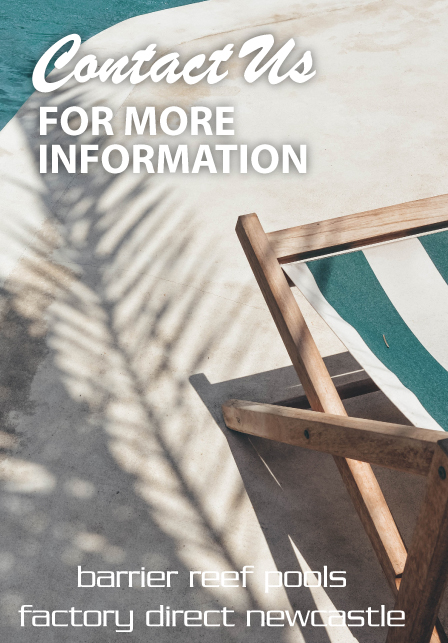Tips To Protect Your Eyes If You're A Daily Swimmer
With the summer months approaching, it's going to become hotter day by day. A great way to cool down on an otherwise hot day is by going for a swim in your fibreglass pool. But if you plan on going swimming every day this upcoming pool season, then you'll need to take care of your eyes as well.
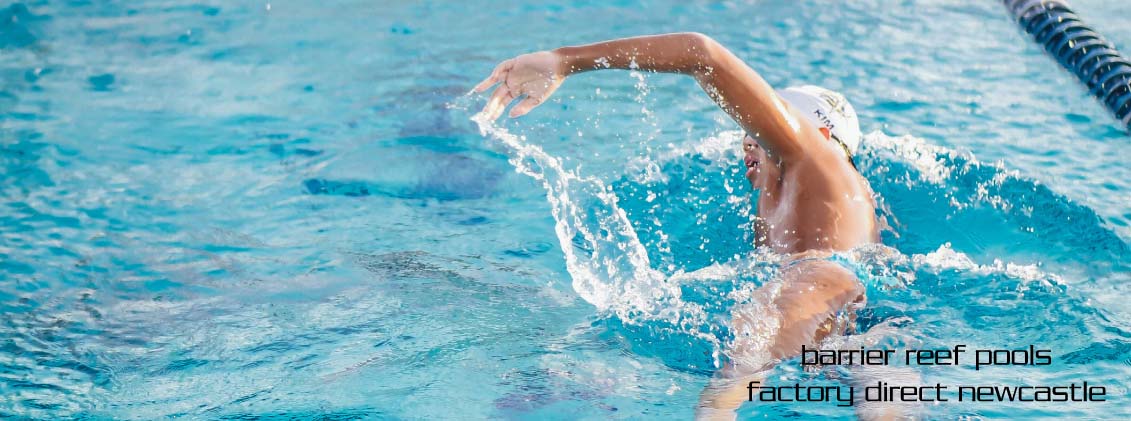
You should already know that you’re not supposed to run near the pool and that you should be careful when you’re diving. But you may not know that you’ll also need to take care of your eye health when you go swimming in your pool. Let’s learn about eye safety when you use your pool daily, and why it’s important.
Pool chemicals and chlorine
It’s highly likely that you either have a chlorine-based pool water system or a saltwater pool. Mineral pools are still rare in the country. But whether your pool water has chlorine in it or saline, these could affect your eyes. Chlorine and saline are great at keeping your pool disinfected, but they can irritate your eyes.
If the chemical balance of your pool water isn’t right, then you can experience irritation in your eyes anytime you enter your pool to swim. Your eyes could sting, or they could turn red. The dryness of the eyes is another issue that you might face.
The pH balance of your fibreglass pool needs to be around 7.4. This is also roughly what the pH of your eyes is. So to maintain the optimal pH balance in your pool, you’ll need to test the water in your pool on a regular basis. Anytime you experience eye irritation while you try to swim, this could indicate that the pH level of your fibreglass pool is off.
Protecting your tear film
Your eyes have a tear film, which is essentially a protective barrier. It’s made using water, oil, as well as mucous, and it’s located in the front of the cornea. A primary reason why pool water affects the eyes is that it can strip away the tear film from your eyes. As a result, your cornea will be left unprotected.
When you go swimming daily, this can lead to you developing dry eye syndrome. This is a condition where the tear film in your eyes stops working properly. You can consider applying lubricating eye drops to your eyes before and after you go swimming. This can help you to protect your tear film.
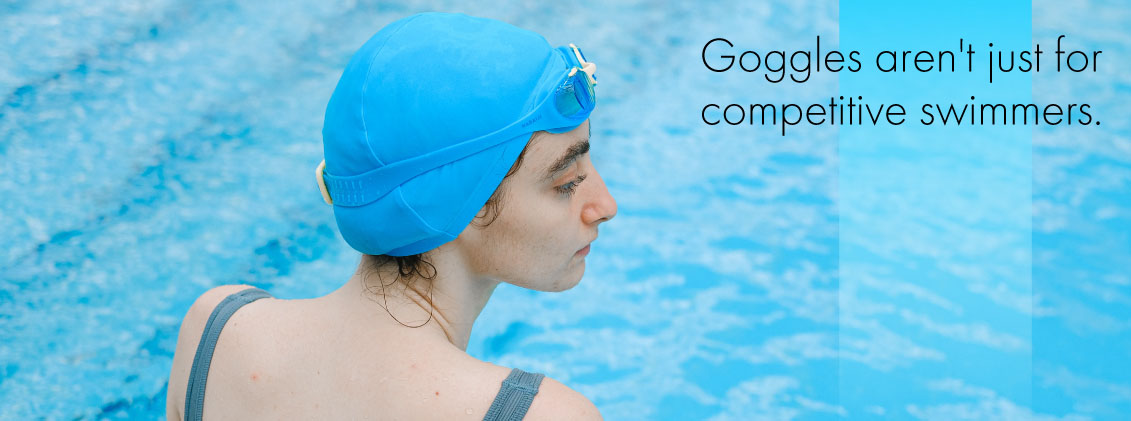
Wearing goggles
Goggles aren’t just for competitive swimmers. They can also effectively protect the tear film in your eyes, any time you go swimming. If you want to spend long hours swimming around in your fibreglass pool, then goggles can become essential.
You’ll find goggles across all price ranges. You can even find prescription goggles as well. Although it may take you some time to get used to your goggles, wearing them is really the best way to protect your eyes in the pool water.
Once you’re done swimming for the day, remember to clean your goggles thoroughly. You’ll need to ensure that you get rid of bacteria that could have gathered on the lenses while you swam. You can simply use two tablespoons of white vinegar, added to a bowl of water, to do this. Leave your goggles in the water mixture for an hour or so. Then thoroughly rinse your goggles and then hang them up to dry.
Don't wear contact lenses
You should never wear your contact lenses when you go swimming. Your contact lenses can easily absorb the bacteria that are present in the pool water. If you find it difficult to see what’s in front of you without your contact lenses, then a safer alternative for you would be to use prescription goggles.
Prescription goggles can protect your eyes when you go swimming in the water, and it also wards off infections as well. Sometimes you may forget to remove your contact lenses before you go swimming in your fibreglass pool. If this happens, then you should take them out as soon as you notice. You should also thoroughly rinse your eyes and clean your contacts.
Staying hydrated
You may not think it at first, but staying hydrated can help you maintain your eye health as well. When you’re dehydrated, this inhibits the production of tears in your eyes. It can also disrupt the tear film, which is meant to keep the eyes protected. Especially on summer days that are hot and sunny, getting dehydrated is not uncommon. In order to ensure that your tear production levels are where they should be, you should drink plenty of water.
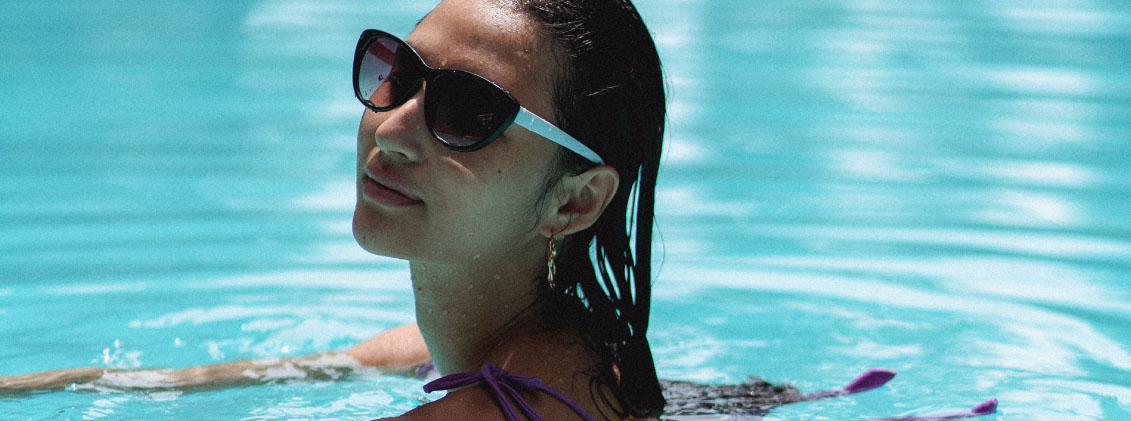
Washing your eyes
After you’re done using your fibreglass pool, remember to thoroughly wash your eyes. This can help you soothe your eyes, in case it was feeling irritated. You’ll also be able to wash away chemical residues that can be present on your lashes or eyelids. You should also ensure that your hands are thoroughly clean before you wash your eyes.
Once you’ve rinsed your eyes, you should then use eye drops to lubricate your eyes. Eye drops can also help in rebuilding your tear film.
Regarding LASIK
If you’ve just had any kind of eye surgery, such as LASIK, then you should avoid using your pool. Wait until your doctor tells you that it would be okay. People who’ve just had any kind of eye surgery should not go swimming and risk chemicals or bacteria potentially entering their eyes.
Even if you think that you can wear your goggles when you go swimming, this isn’t enough to protect your eyes while they’re recovering.
Conclusion
It’s important to protect your eyes any time you decide to go swimming in your pool. The chlorine in the pool water, as well as the bacteria that could be present in it, can otherwise affect your eyes. Protecting your eye health helps ensure that you can go swimming whenever you want to, without worrying about how it could affect your eyes.
Tips To Protect Your Eyes If You're A Daily Swimmer
With the summer months approaching, it's going to become hotter day by day. A great way to cool down on an otherwise hot day is by going for a swim in your fibreglass pool. But if you plan on going swimming every day this upcoming pool season, then you'll need to take care of your eyes as well.
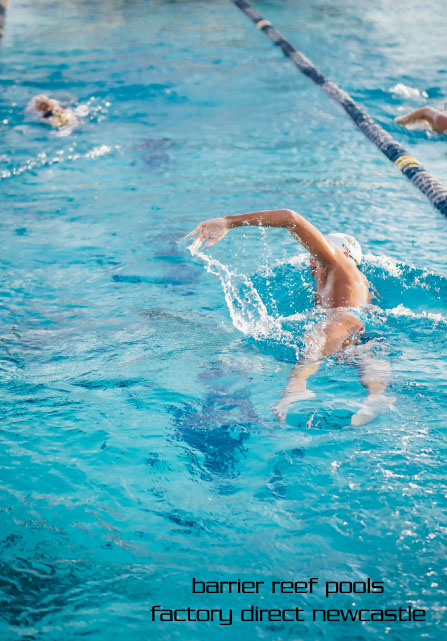
You should already know that you’re not supposed to run near the pool and that you should be careful when you’re diving. But you may not know that you’ll also need to take care of your eye health when you go swimming in your pool. Let’s learn about eye safety when you use your pool daily, and why it’s important.
Pool chemicals and chlorine
It’s highly likely that you either have a chlorine-based pool water system or a saltwater pool. Mineral pools are still rare in the country. But whether your pool water has chlorine in it or saline, these could affect your eyes. Chlorine and saline are great at keeping your pool disinfected, but they can irritate your eyes.
If the chemical balance of your pool water isn’t right, then you can experience irritation in your eyes anytime you enter your pool to swim. Your eyes could sting, or they could turn red. The dryness of the eyes is another issue that you might face.
The pH balance of your fibreglass pool needs to be around 7.4. This is also roughly what the pH of your eyes is. So to maintain the optimal pH balance in your pool, you’ll need to test the water in your pool on a regular basis. Anytime you experience eye irritation while you try to swim, this could indicate that the pH level of your fibreglass pool is off.
Protecting your tear film
Your eyes have a tear film, which is essentially a protective barrier. It’s made using water, oil, as well as mucous, and it’s located in the front of the cornea. A primary reason why pool water affects the eyes is that it can strip away the tear film from your eyes. As a result, your cornea will be left unprotected.
When you go swimming daily, this can lead to you developing dry eye syndrome. This is a condition where the tear film in your eyes stops working properly. You can consider applying lubricating eye drops to your eyes before and after you go swimming. This can help you to protect your tear film.
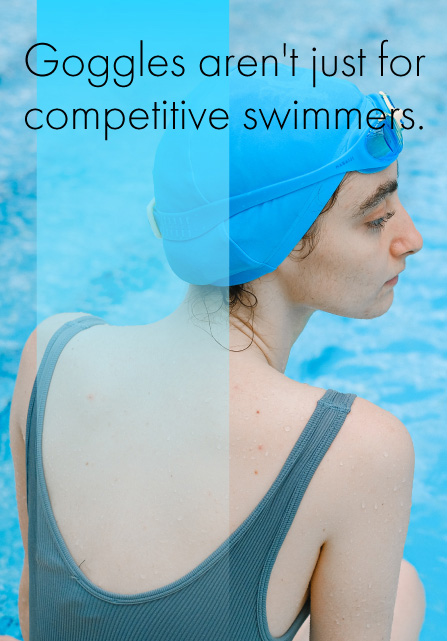
Wearing goggles
Goggles aren’t just for competitive swimmers. They can also effectively protect the tear film in your eyes, any time you go swimming. If you want to spend long hours swimming around in your fibreglass pool, then goggles can become essential.
You’ll find goggles across all price ranges. You can even find prescription goggles as well. Although it may take you some time to get used to your goggles, wearing them is really the best way to protect your eyes in the pool water.
Once you’re done swimming for the day, remember to clean your goggles thoroughly. You’ll need to ensure that you get rid of bacteria that could have gathered on the lenses while you swam. You can simply use two tablespoons of white vinegar, added to a bowl of water, to do this. Leave your goggles in the water mixture for an hour or so. Then thoroughly rinse your goggles and then hang them up to dry.
Don't wear contact lenses
You should never wear your contact lenses when you go swimming. Your contact lenses can easily absorb the bacteria that are present in the pool water. If you find it difficult to see what’s in front of you without your contact lenses, then a safer alternative for you would be to use prescription goggles.
Prescription goggles can protect your eyes when you go swimming in the water, and it also wards off infections as well. Sometimes you may forget to remove your contact lenses before you go swimming in your fibreglass pool. If this happens, then you should take them out as soon as you notice. You should also thoroughly rinse your eyes and clean your contacts.
Staying hydrated
You may not think it at first, but staying hydrated can help you maintain your eye health as well. When you’re dehydrated, this inhibits the production of tears in your eyes. It can also disrupt the tear film, which is meant to keep the eyes protected. Especially on summer days that are hot and sunny, getting dehydrated is not uncommon. In order to ensure that your tear production levels are where they should be, you should drink plenty of water.
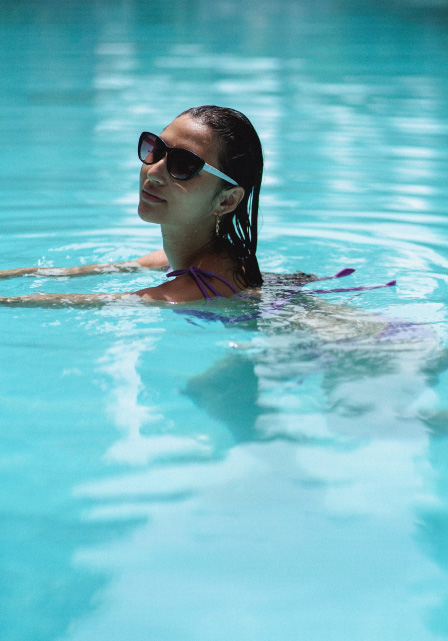
Washing your eyes
After you’re done using your fibreglass pool, remember to thoroughly wash your eyes. This can help you soothe your eyes, in case it was feeling irritated. You’ll also be able to wash away chemical residues that can be present on your lashes or eyelids. You should also ensure that your hands are thoroughly clean before you wash your eyes.
Once you’ve rinsed your eyes, you should then use eye drops to lubricate your eyes. Eye drops can also help in rebuilding your tear film.
Regarding LASIK
If you’ve just had any kind of eye surgery, such as LASIK, then you should avoid using your pool. Wait until your doctor tells you that it would be okay. People who’ve just had any kind of eye surgery should not go swimming and risk chemicals or bacteria potentially entering their eyes.
Even if you think that you can wear your goggles when you go swimming, this isn’t enough to protect your eyes while they’re recovering.
Conclusion
It’s important to protect your eyes any time you decide to go swimming in your pool. The chlorine in the pool water, as well as the bacteria that could be present in it, can otherwise affect your eyes. Protecting your eye health helps ensure that you can go swimming whenever you want to, without worrying about how it could affect your eyes.


